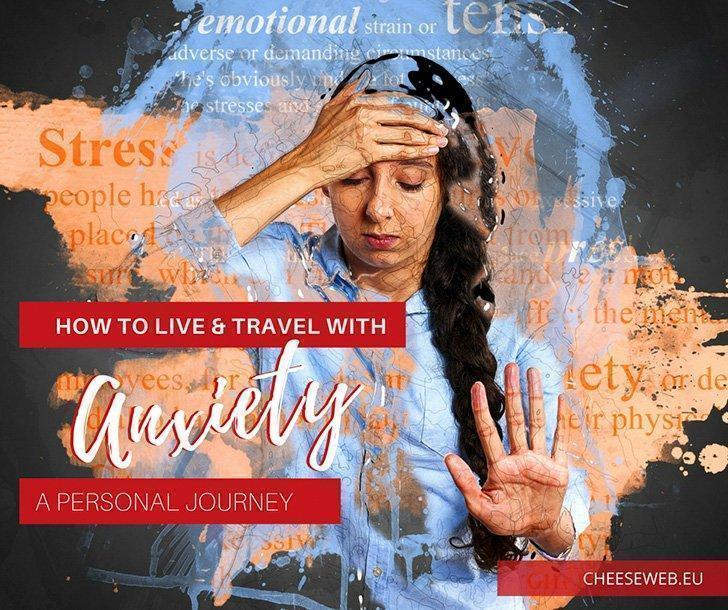
In this article, I’m sharing my personal journey with anxiety and panic disorder as well as some practical advice on how to live and travel with anxiety if you or someone you love is diagnosed with this mental illness.
This is not a typical CheeseWeb article. Over the years we’ve shifted away from telling our personal stories to offering more practical tips and advice for the places we visit. I don’t mind if you move on to one of those articles, but if you or someone you know suffers from anxiety, I urge you to read on and educate yourself about this disease. If you don’t think you know someone with anxiety, think again. It’s estimated that 15.5% of the global population suffers from a mental illness; 4% from anxiety disorders alone (5-6% if you live in North America or most of Europe). That’s about 275 million people. You probably know at least one of them.
I hope this article will be helpful and practical in its own way, but before I get to the advice, I feel like I need to tell a very personal story first – the story of my battle with mental illness. (If you’d rather skip ahead to the advice, that’s ok too; use the link in the table of contents below.)
It should go without saying, but I’m going to spell it out anyway, I am not a medical professional. This post is not intended as medical advice. If you suspect you have a mental illness, please, please, see your doctor or a qualified therapist. Getting professional help was the single best thing I did to help my own anxiety, so if you take nothing else away from this article, please seek medical help.
Table of Contents
Why Write About Anxiety Now?
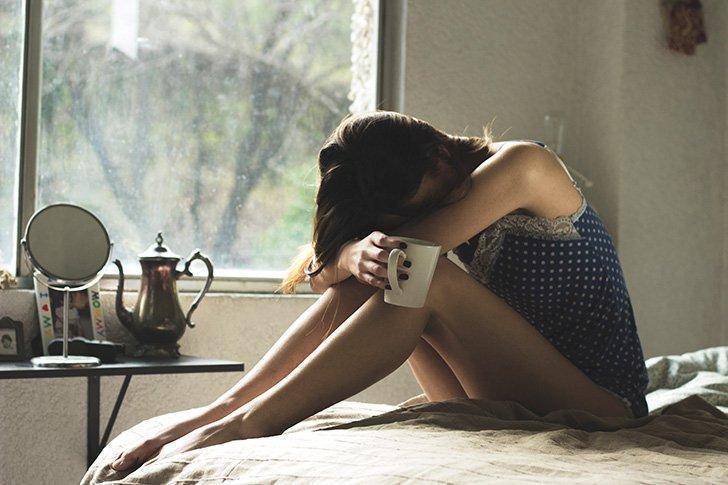
This article has been percolating in my brain for a few months now. When I was diagnosed with anxiety and panic disorder, I researched like crazy. I wanted to share my story and findings to help others, but like so many people, I was afraid of the stigma surrounding mental illness. Several recent suicides of prominent figures have pushed mental illness to the forefront of conversation and now seems like the right time to keep the conversation going.
Like so many others who love travel and food, I was blindsided by the death of one of my writing and culinary heroes, Anthony Bourdain. How could someone who, from the outside, had a perfect life, filled with travel, food, fame, respect, a daughter, girlfriend, and friends and fans around the world who loved him, take his own life? The answer is simple – illness.
Despite all we now know about mental illness there is still a huge stigma surrounding it. Judgements range from sufferers being ‘weak’ for not being able to cope on their own, to being ‘crazy.’ We would never call someone who died of cancer weak; we call them fighters. But yet, someone who succumbs to mental illness is often accused of ‘taking the easy way out.’
I’ve even read reports of people blaming Anthony’s girlfriend for his suicide. Can you imagine blaming a spouse for someone’s MS? Of course not; it’s ridiculous. But yet, a disease of the mind is still not viewed or treated the same way by our society – and even some health care professionals (which I’ll get to in my personal story.)
So coming forward with my own mental illness is hard. I’m terrified of the judgement, of being labelled, even of being pitied. But I firmly believe we can only overcome the stigma by talking openly and honestly about all forms of mental illness. My journey is with anxiety and if reading it helps even one person feel less alone, less ‘crazy,’ and pushes them to get help, then my discomfort at opening up is worth it.
What is Anxiety Disorder?
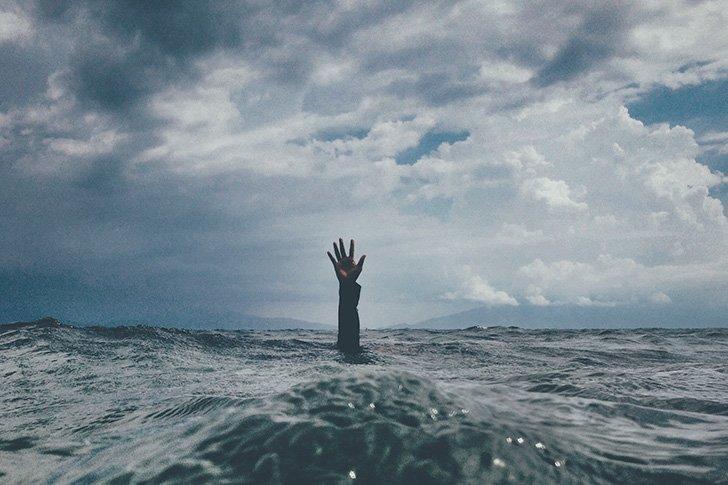
We use the words anxiety and anxious a lot when we mean to say we’re worried. But an anxiety disorder is so much more than being worried. In fact, there is a wide variety of anxiety disorders, and it’s possible to suffer from more than one at a time. These include generalized anxiety disorder (GAD), phobias, social anxiety, separation anxiety, panic disorder, OCD, and PTSD.
Anxiety and depression often go hand in hand, although not everyone with anxiety suffers from depression and vice versa. Thankfully, although I dealt with some situational depression when my father passed away, I don’t suffer from major depressive disorder and have never experienced suicidal thoughts; quite the opposite (but I’ll get to my personal story in a moment).
Anxiety disorders are more common than you may think. Anywhere from 5-30% of people will suffer from anxiety at some point in their life and at least twice as many of those affected are women.
The most common form of anxiety is generalized anxiety disorder or GAD, and symptoms vary as widely as the people who suffer. Fatigue, restlessness, numbness in the extremities, headaches, difficulty swallowing, muscle tension, trouble concentrating, stomach upset, shakiness, insomnia, hot flashes, sweating, rashes, and irritability. These symptoms need to be present for six months or more for a formal diagnosis.
To put it in terms we can all understand, think about how you feel when you’re afraid of something, and your fight-or-flight response kicks in. This is a normal response to a scary situation. It’s a good thing, designed to keep us safe and alert. But it doesn’t feel very good when it happens. Now imagine that feeling happening for days or weeks (or longer) without shutting off. That’s what it feels like to have GAD.
My GAD came to a head when I started suffering from panic disorder, or reoccurring panic attacks. These are “sudden periods of intense fear that may include palpitations, sweating, shaking, shortness of breath, numbness, or a feeling that something really bad is going to happen.” This definition actually sounds pretty innocuous compared to the reality. My doctor explained that panic disorder happens when the cycle of panic attacks becomes self-perpetuating. Essentially, you start having attacks so often; you worry about the panic attacks themselves – thereby causing more panic attacks. I can tell you; it’s horrible and incredibly isolating. You feel terrified to go out in public or to be on your own, for fear of an attack.
My Anxiety Journey
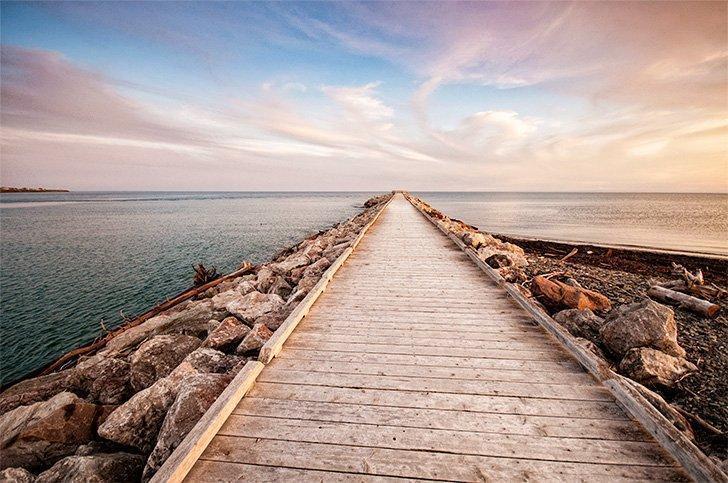
Let me back up from the panic attacks to share how I finally came to a diagnosis. But first, I have to explain a bit about my personality, because so much of this journey has been about figuring out where my personality ends and my anxiety begins.
For those of you who understand the Myers-Briggs personalities, I’m an INFJ, the rarest of the 16 types. If you have no idea what I’m talking about, this article sums up my personality to a T. Essentially; I’m a highly sensitive introvert.
Contrary to popular opinion, introverts don’t hate people. I enjoy meeting new people and having meaningful conversations. It’s one of the things I love about travelling; developing deeper understandings of new cultures and people. But being around people drains my energy, and I feel uncomfortable in large crowds and making small talk.
While you’ll hardly ever know it by looking at me, I am deeply sensitive. I often know how people feel before they do, but a lot of times I don’t know what to do with this insight. It leads to a lot of overthinking. I replay conversations over and over in my head – long after they’ve happened (sometimes years) and I think about future discussions (which may never even happen in reality) over and over trying to determine every possible outcome.
This overthinking isn’t just about conversations. It can happen in every aspect of my life, and I almost always go to the worst-case-scenario. I’ve always lived by the mantra ‘prepare for the worst,’ and while this seems completely logical to me, at 20, I was told I was ‘way too cynical for someone so young,’ by a dear, much older friend.
I have a hard time not being in control. As you might expect, as a full-time traveller who has lived in several countries and overcome monumental challenges (I’m looking at you Belgian citizenship), I’ve been in lots of situations well outside of my control.
Looking back now, with the benefit of hindsight, I can clearly see my anxiety rearing its head at challenging points in my life: when we first moved to Belgium, and Andrew’s company refused to help us; when Andrew was working crazy hours, and I was struggling with my identity loss as a trailing spouse; when we were trying to decide between moving to Brussels or leaving Belgium altogether; when Andrew was doing his MBA, and we struggled with the question of ‘what next?’
But no challenge holds a candle to my father’s cancer diagnosis and death a year later. This in itself was terrible enough, but on top of it we had to handle moving back to Canada, selling our motorhome remotely and buying a new motorhome in the middle of winter, getting our cats back to Canada, and figuring out how to reposition our business – all of this while struggling with the immense grief of watching my father die.
True to form, I kept everything inside. I pushed it down; I bottled it up. As my doctor said, ‘your brain knows when it just doesn’t have time to break down so it waited until you could handle it.’ Except, I couldn’t handle it when it happened, because I didn’t understand what was happening.
Since our return to Canada, I had been experiencing a whole range of unpleasant health symptoms: loads of muscle pain and tension, headaches and migraines, gastrointestinal problems, a persistent cough, the list goes on. I chalked everything up to symptoms stemming from an auto-immune disorder I was diagnosed with in my early 20s.
Unfortunately, I had no health care provider to talk to about my symptoms. Here in New Brunswick, we have a doctor shortage, especially when it comes to general practitioners. When Andrew and I moved in with my parents, we went on a waiting list for a family doctor. At that point, I was hearing from friends who had been on the list for over three years, before getting a doctor. As the symptoms progressed and worsened, I became more and more stressed about my own health situation.
The year after my Dad passed away, I started having panic attacks. They were infrequent at first, and I could get them back under control with Andrew’s help. Until one night I couldn’t get my breath, I had searing pain in my chest, and my hands went numb. I was experiencing all of the signs of a heart attack in women. Andrew rushed me to the ER. I was in such a state I was blacking out in the car. When we arrived that the hospital, the nurses rushed me into a room and had me hooked up to monitors in no time flat. (They don’t mess around when they suspect a heart attack).
Just being in the hospital and knowing I was safe, I started to calm down. My heart was fine, and after a variety of tests, everything came back normal. The ER doctor came in to tell me the news. When I asked him what was wrong with me, he said I likely had a panic attack. There was no medical emergency, and therefore his job was done. When I explained I didn’t have a family doctor I could go to, he told me to get on the waiting list. When I told him I had been on the list for almost two years at the point he shrugged and said, ‘Yes, it’s a problem.’ I was desperate at this point and practically in tears and asked if there was anything I could do. He looked at me and said, ‘some people find it useful to breathe into a paper bag,’ and walked out of the room.
I managed to get through the next year, trying to cope as best I could. I went to a physiotherapist who helped with some of the muscle pain I was experiencing. I ended up in the ER a few more times for issues related to other symptoms and was able to see a hematologist about my autoimmune disorder. I explained all my weird and wonderful symptoms to her, and she ran a battery of tests. There was nothing conclusive. She switched my medication to see if it would help, but the symptoms persisted. Travelling over the summer helped distract me, and I did manage to process some of the grief I was experiencing over the loss of my Dad. Like everyone struggling with anxiety, I had good periods and bad periods.
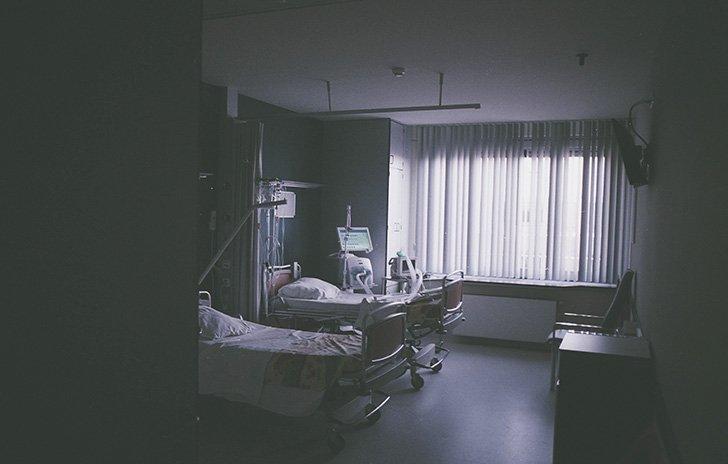
Everything came to a head last January. I had been doing well throughout the fall and had a great trip to Belgium and Germany with my Mom in December, but then everything started to go downhill. I caught a flu bug that lingered. I was congested and coughing all the time. I was exhausted. On top of it all, I was having migraines several times a week. I would just start to feel better when I would be hit by another blinding migraine. I was worried there was something very wrong and my anxiety was convincing me I was dying.
Finally, I went to the ER. The doctor was young and seemed nice, so I explained everything that had been happening for the past month and that the migraines were becoming debilitating. He told me I was stressed and that Andrew and I should work on doing more things together as a couple. I didn’t know how to react. I asked him if he could refer me to a neurologist for help with the headaches and he told me the waiting list was so long I wouldn’t get in for at least six months, so there was really no point. He ran no tests. He offered no migraine prescription, even when I told him I had had pills in the past that helped. Once again I was on my own. The migraines and panic attacks persisted.
A week later, I was feeling a bit better, and Andrew and I went out to do some errands. While I was out, I began to feel overwhelmingly dizzy and tired. I just knew something was wrong. Even though I thought it was futile, my only option was to go back to the ER. This time, I had a doctor who actually listened and ran a bunch of tests. I was dehydrated and suffering from a persistent virus. He explained the exertion from coughing was triggering the migraines which were perpetuating the cycle. He prescribed medication for both the virus and the migraines and gradually both started to get better. The panic attacks didn’t.
I hid the panic attacks from everyone, but my innermost circle of family and friends and even then I didn’t discuss how crippling they were becoming. The only person who knew the extent of the attacks was Andrew. I was ashamed, embarrassed, and alternating between believing I was dying to thinking I was crazy. Some days I was convinced I had cancer, or some other horrible disease going untreated because no one would listen to me. Other days I believed I was the world’s biggest hypochondriac and was legitimately losing my mind. Just writing about how bad I felt then triggers my anxiety now.
I tried everything to make the panic stop: yoga, meditation, breathing techniques, exercise; nothing helped. Finally, I decided to talk to a counsellor who had been recommended by a friend. She gave me some helpful techniques to calm down the panic attacks once they started but it didn’t stop them from happening in the first place.
Andrew was my rock, and I honestly don’t know where I’d be today if he didn’t stand patiently by trying everything he could to help and understand what was happening to me, without judging. He started calling every doctor he could find to see if they were taking patients. When a new doctor turned up in town, he called right away. He was told her roster was full but to call back in a few weeks. When he did, we received an appointment for an ‘interview.’ Yes, in NB, so many people need GPs, they are interviewing for patients. Luckily, we were accepted, and I clicked with my doctor right away. She scheduled me for a variety of tests and follow-ups, but it would still be almost a month before I could discuss my anxiety with her.
In the meantime, I was still doing everything I could think of to help myself. I turned to the one thing I always do to empower myself – research. I read everything I could get my hands on about panic attacks which eventually led me to GAD. The pieces began falling together. The muscle pain, the tension headaches, the numbness, and stomach issues all pointed to anxiety. The more I read, the more it made sense, but admitting I had a mental illness was another issue altogether.
I continued to explore self-care options and started going for massages. I thought they would help with my muscle tension and relax me. And they did – until I had a panic attack in the middle of the session. Somehow I managed to get through the end of the massage without jumping off the table and running screaming from the room. It took every ounce of strength I had and definitely was not relaxing. It’s almost funny to picture it now, but it was horrible at the time. I drove home shaking and terrified I was going to have a full blown attack in the car.
After that fateful massage, I was afraid to leave the house and I sure as hell wasn’t going to drive. I wouldn’t go anywhere without Andrew because I was scared I would have an attack. They happened when I least expected them – at home watching TV, at a coffee shop in the middle of a business meeting, they even woke me up at night.
Finally, my appointment to discuss my panic attacks with my new doctor arrived. After my ER experiences, I was worried I’d be blown off again. Thankfully that was far from the case. She listened. She asked thoughtful questions. She told me I had been experiencing a perfect storm of anxiety – physical illness from the virus, stress from my father’s passing that was bubbling to the surface, seasonal affective disorder from being cooped up in a Canadian winter, and hormone imbalance from early menopause.
Then she explained the cycle of panic disorder and how we would need to break the cycle. Because I had already tried other options, like meditation and counselling, and they hadn’t been effective, the best option was medication. “Does that terrify you?” she asked. I said honestly that it did, but I didn’t feel like there was any other option.
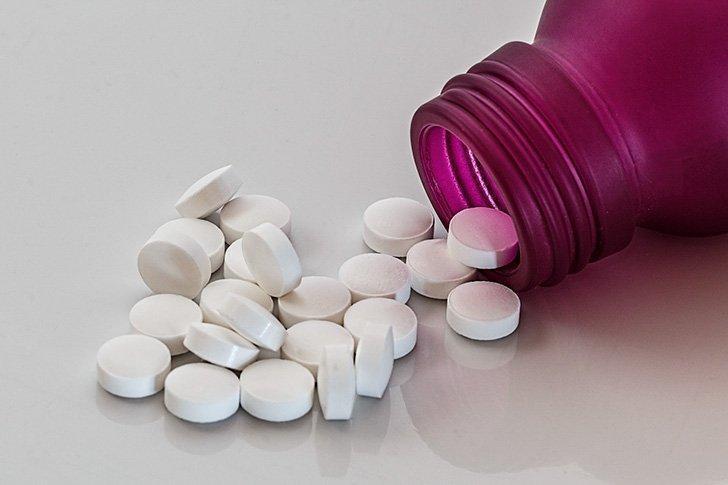
Like so many people, I spent much of my life believing mental illness was just weakness. If I was strong enough, I shouldn’t need medication to solve my problems. But I was so desperate to feel ‘normal’ again I would try anything.
She started me on the lowest possible dose of anti-anxiety medication. After two weeks, I would double the dose and see how I felt. She warned me that things would most possibly get worse before they got better while the medication altered the chemicals in my body.
The worst part of the first two weeks was actually insomnia, a common side-effect of the medication I was taking. My doctor recommended taking melatonin before bed, and after a few days, it did the trick. The panic attacks didn’t stop immediately, but the frequency lessened, and it’s been over a month since I last had one.
As for my anxiety, looking back now, I can see so many occasions in my past where I suffered, right back into childhood, thinking it was just stress or worry. I’ve continued to read and educate myself as much as I can, and I’m gradually coming to blame myself less for something I can’t control.
Despite my tendency to hide my emotions and keep my private life private, I decided to be open about my anxiety and panic disorder because reading other people’s stories helped me so much. (Below I list some specific articles and resources that helped me.) I ‘came out’ about my mental illness, first on Facebook. I was shocked by how many of my friends and acquaintances reached out in the comments and via private message to share their struggles. The vast majority were women, although there were a few men too, and the stories were heartbreakingly similar to mine.
It makes me both sad and angry that so many of us have suffered in silence for so long because of the fear of being judged for an illness we can’t control. When someone is diagnosed with a disease like cancer, people rally around and show their support – they don’t blame the person who is ill.
I hope by sharing my story, it will encourage you to educate yourself about mental illness – both how to get help if you are suffering and how to provide support if someone you love is suffering (see my advice for caregivers below).
10 Tips to Cope with Anxiety while Travelling and at Home

One thing that is important to mention before I get straight to the tips is everyone experiences anxiety differently. This means the strategies to manage anxiety that work for me, may not work for you and vice versa. That said, all of these tips are beneficial to all of us, mental illness or not, so it can’t hurt to give them a try.
1. Create your personal ‘safe space’ when you travel and at home
Having an environment that makes you feel safe and calm is essential when you have anxiety, and it’s absolutely vital if you’re an introvert like me. At home create yourself a peaceful space, filled with things you love. Minimise the chaos by keeping it neat and tidy and if you share your home with others, make sure they know to respect your privacy when you’re in your space.
It’s harder to do this when you travel because you’re not always in charge of your space. This is one of the reasons I love travelling in our RV – I carry my personal space with me wherever I go. If the outside world gets too chaotic or stressful, I can retreat to the motorhome where everything is the way I like it.
When we’re not travelling by RV, I find it more comfortable if we don’t switch accommodations too often. We used to make epic road trips where we’d be in a different hotel every night. I can do this for short bursts of time, but it quickly wears me out. These days, I prefer to choose one or two locations and make our base there. Then we can day trip out but come back to our home-away-from-home every night.
You can also make your hotel or apartment homier by binging along a few personal touches, a favourite pillow, photos of loved-ones, or any little item that brings you joy and peace.
2. Find your ‘Happy Place’ and go there often
While my ‘safe space’ is a physical location, my ‘happy place’ is more of a state of mind. It’s more about being in an environment and participating in activities that calm and center you. My happy place is in nature, specifically by the sea, but forests, mountains, or any other beautiful natural environment brings me peace. When I’m on a beach, I can actually feel the anxiety melting away. Hiking through a forest gives me something other than my worries to focus on.
Your happy place may not be nature. It could be a crowded city street, an art gallery, a bookstore. It could be something physical like swimming laps or jogging, or it could be meditating in a quiet room.
The great thing about your happy place is because it is a state of mind, you can find it at home or when you travel. Everyone’s happy place is different. Find yours and go to it as often as you need.
3. Move your Body
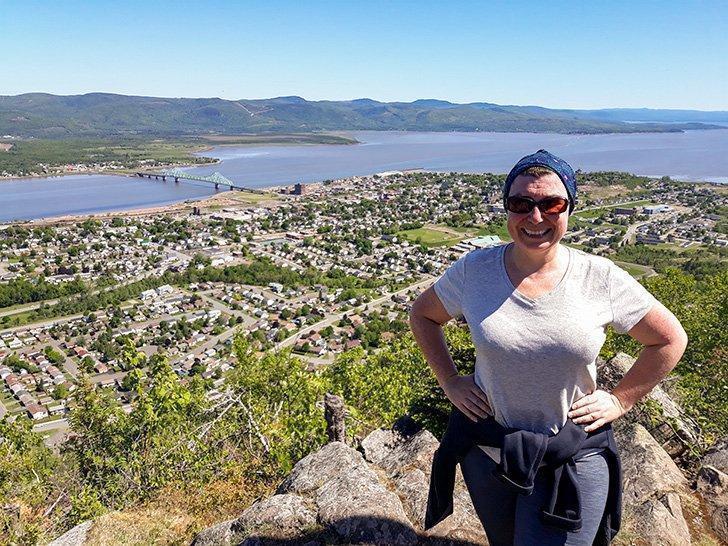
It’s hard to find the motivation to move when you feel like crap. I get this. Boy, do I get this. But exercising has a few significant benefits for those of us who cope with anxiety. (I shared a Facebook post on a physical achievement I made recently and how that made me feel.)
First, it’s a great distraction technique (see below). If you’re pushing your body physically, you need to concentrate. If you’re focused on the activity, you’re not focusing on your worries.
Second, physical activity releases endorphins. These are hormones that make us feel good, and feeling good is kind of the point.
Third, it’s harder to have a healthy mind when you don’t have a healthy body. When your body feels good, and you feel good about your body, it starts to impact your mental health positively. It may not ‘fix’ your anxiety, but a healthy you on the outside leads to more positive feelings inside.
4. Distract Yourself
Distraction is particularly important if you also suffer from panic attacks. You get so focused on the worry or panic attack itself; it’s hard to break its hold on you. Do anything you need to break the cycle. It can be challenging to do something that requires a lot of focus, like reading or concentrating on something so allow yourself some guilty pleasures here. Watch a TV show you love, go for a walk or do some other physical activity you enjoy (as in #3), talk to a friend, play a game (I have a mindless game on my phone I play a LOT to distract myself), listen to upbeat music that inspires you.
My counsellor recommended a technique I’ve found helpful during a full-blown panic attack: choose a letter of the alphabet then write down all of the place names you can think of that begin with that letter. When you can’t think of any more, pick another letter. Keep going until you feel calmer. Little brain games like this are an easy way to focus on something other than your panic or stress, and you can do them anywhere.
5. Be Mindful of What You Put in Your Body
Like exercising, what you eat and drink won’t ‘cure’ a mental illness, but it certainly won’t hurt. If you have anxiety, limit foods and beverages that make you even jitterier, like caffeine and sugar.
It’s easy to use food as a way to cope, but it’s a slippery slope. Eating cake or a bag of chips may make you feel better in the moment, but if you self-medicate with food regularly, you’re only going to add more health issues to your list of worries.
The same thing goes for alcohol. It was easy for me to have a glass of wine to ‘calm my nerves’ but there’s a reason mental illness and substance abuse often goes hand in hand. Numbing your emotions isn’t effectively coping with anxiety. I decided to quit drinking for a few months when I first began my antianxiety medication, to get a baseline of how I felt without booze. It was enlightening when I realised how much I was leaning on wine to make me feel better – or not feel anything. I’m back to having an occasional drink on weekends now, but I’m controlling the booze and not the other way around.
6. Get Enough Rest
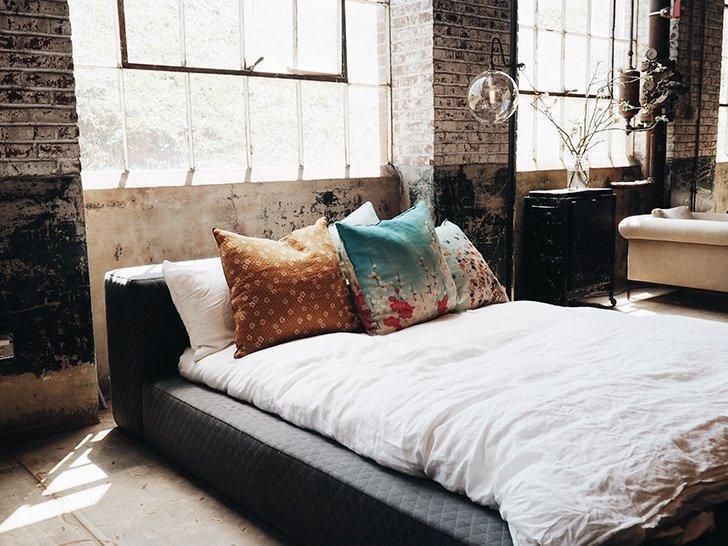
When I say get enough rest, I mean two things. The first is obvious – sleep. We all know not getting enough sleep exacerbates a whole raft of problems both physical and mental. But it can be impossible to get a good night’s sleep when you’re anxious, and your brain is racing at the speed of light. To make matters worse, insomnia is a common side-effect of a lot of antianxiety medication.
After surpassing two weeks of getting less than four hours sleep each night, I talked to my doctor about my insomnia. She suggested taking melatonin right before bed. She said to start with the lowest dose, 3mg, and double it to a maximum of 10mg until I found what worked for me. I was able to break my cycle of insomnia within a week, and now I only use the melatonin when I need it. (Obviously, please talk to your doctor or pharmacist before taking anything.)
Another great benefit to travellers is melatonin can help you fight jet-lag by resetting your internal clock. I plan to test this when I fly to the west coast later this year.
Another sleep aid I like to use both at home and on the road is aromatherapy. Lavender, in particular, is relaxing (plus it smells great). In our motorhome I have a small aromatherapy diffuser that works in a USB port, making it perfect for travel. It also fits in a cup holder so I can use it while we drive (a great feature if you get anxious while driving).
I also have lavender pillow spray, and a lavender roll-on I apply to my pressure points.
Just be careful using aromatherapy around your pets as they are highly sensitive to some scents and it can even be toxic.
7. Learn How to Breathe
Of course, we all know how to breathe but learning how to control your breath and breathe with mindfulness can be extremely helpful for calming anxiety and panic attacks. I had learned a few meditation techniques when I began practicing yoga (which is a great physical and mental activity for easing anxiety in itself). When my anxiety got worse, however, I found I couldn’t concentrate on meditating without help. This was when guided meditation came in handy.
You can find loads of free guided meditations on youtube, and there are a variety of apps you can download. The ones I found most helpful are:
- Headspace – A great app if you are new to meditation or you want to build on existing skills. It teaches you easy techniques for controlling your breathing and thoughts. There is a free version with paid upgrades.
- Calm – I love this app so much I paid for the full subscription but you still get a lot with the free version. There are daily guided meditations as well as meditations on a variety of different themes, including calming anxiety and an ‘emergency calm’ when you’re panicking or feeling overwhelmed. The app also has music for calm and focus and ‘sleep stories’ to help lull you to sleep.
- Panic Relief Free – A simple app to use if you are experiencing a panic attack. It gives you easy physical and breathing exercises to focus your mind on something other than you panic
8. Track Your Mood
Understanding what you feel when can be a powerful tool. We all have triggers for our anxiety, but sometimes it’s hard to know what they are. Tracking your mood over time, in combination with things like how much exercise, food, water, alone time, interaction with friends, etc. can help us understand when we feel our worst. This understanding can help us change the patterns that lead to anxiety attacks. You can do this as simply as writing how you felt throughout the day in a journal.
For smartphone addicts, like me, there are loads of apps to help. My favourite is Pacifica. This app offers a variety of different features like meditations, goal setting, a mood board where you can post positive images and accomplishments, and a health tracker that lets you record a variety of factors that impact your mood. The most useful feature, in my opinion, is the mood tracker which merely asks ‘how are you feeling?’ You rate your mood from Great to Awful. If you want, you can add more detail about your day and your emotions. The app charts your progress over time and allows you to look for connections between your mood and the other factors you’re tracking. It’s a great tool for control freaks like me who like to have lots of data to study!
9. Educate Yourself
Education is one of the most important tools in your arsenal, whether you have anxiety yourself or are trying to support someone who does. I’m a researcher by nature and having as much information as possible helps me feel in control. Of course, you need to be careful where you get your information. There is so much misinformation about mental illness out there, if you are unsure or suspicious of anything, confirm it with your doctor.
Here are a few resources I found particularly helpful:
- The Anxiety and Depression Association of America
- WebMD’s Anxiety & Panic Disorders Health Center
- Canadian Mental Health Association Your Mental Health
In addition to medical articles, I found it useful to read articles from other people with mental illnesses. While no two people experience or cope with anxiety in the same way, it is so reassuring to know that other people are struggling with similar issues and managing them successfully.
These are a few pieces I found particularly inspiring:
- My name is Wil Wheaton. I Live With Chronic Depression and Generalized Anxiety. I Am Not Ashamed.
- What Kate Spade, Anthony Bourdain, Me, And 45 Million Americans Have In Common
- 15 Signs That You’re An Introvert With High-Functioning Anxiety (If you are an introvert, especially an INFJ, I cannot recommend the Introvert, Dear website)
- Chef Dave Chang spoke about Anthony Bourdain’s death and his battle with mental illness on his podcast. It’s an extremely emotional but powerful episode.
10. Talk to Someone
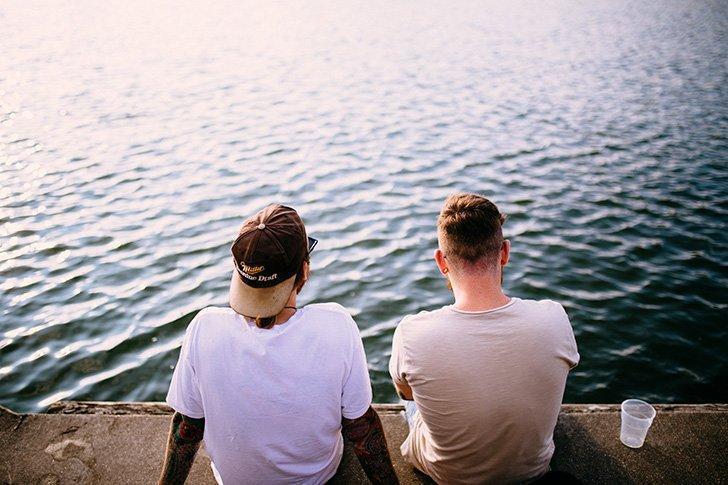
If you take away only one thing from this article, please let it be this – if you know, or even suspect, you have a mental illness, talk to someone about it right now. It can be a doctor, therapist, trusted friend or family member, or call a hotline if you feel you have no one to turn to. Don’t wait another day suffering from this on your own. Everything continued to get worse for me until I talked to someone.
If you feel strong enough, be open about your mental illness. You don’t have to write a 6000-word diatribe and post it online for the world to read like me, but I can’t tell you how liberating it was for me to begin to open up to people I trusted about what I was experiencing. When I first admitted my illness to my Facebook friends, the outpouring of support and care was overwhelming and I no longer felt alone in my battle.
If you don’t feel safe talking openly about your anxiety, talk to your doctor or see a therapist. They can provide you with techniques and medication that can help. It isn’t a weakness to ask for help for an illness; it is a strength.
How to Support Someone with Anxiety
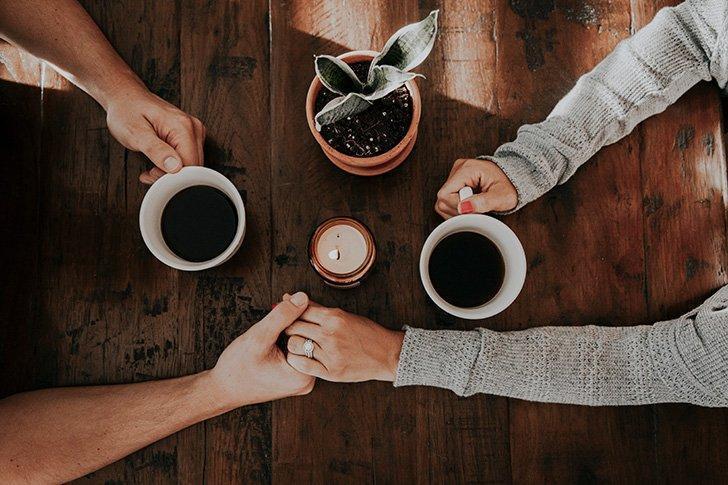
When I started speaking openly about my mental illness, a few of my friends asked how they could best support their other loved ones with anxiety and me. The best piece of advice I can offer is to listen. Listen without speaking, without judging, without offering advice.
I know this sounds counterintuitive when all you want to do is help. But here’s the thing – the person with anxiety is being judged All. The. Time. By themselves and their inner critic, by society, by well-intentioned people offering helpful advice like ‘just don’t worry about things so much,’ or ‘don’t let it get to you.’ Can you imagine saying to a person with cancer, ‘just don’t let it get to you?’
Talk openly about and educate yourself about mental illness. Let people know you are a safe, non-judgemental ally to those who are coping so when they need to they’ll know they can reach out to you.
Learn the common signs of mental illness and check in regularly if you suspect a loved one is suffering.
Ask how you can help. Don’t assume you know what your loved one needs.
Here are a few resources with more great advice:
- How to Help a Loved One with a Mental Illness
- How to Help Someone with Anxiety
- 12 Tips for Friends and Family of Those With Anxiety
- 11 Signs Someone Might Have an Anxiety Disorder
I don’t think my anxiety will ever be ‘cured’ as such, but I am certainly feeling much better and more in control of my emotions than I was even two months ago. I still have anxious moments, but I feel better equipped to cope with them. I now understand my anxiety is caused by how my brain is wired not by me being ‘weak’ or ‘crazy.’
While I’m still terrified by putting my illness out there for the entire world to judge, I want to be part of the solution for removing the stigma surrounding mental illness. We need to talk about mental illness, so no one else feels there is no hope.
There is hope. There is help. Hold on. Please hold on.
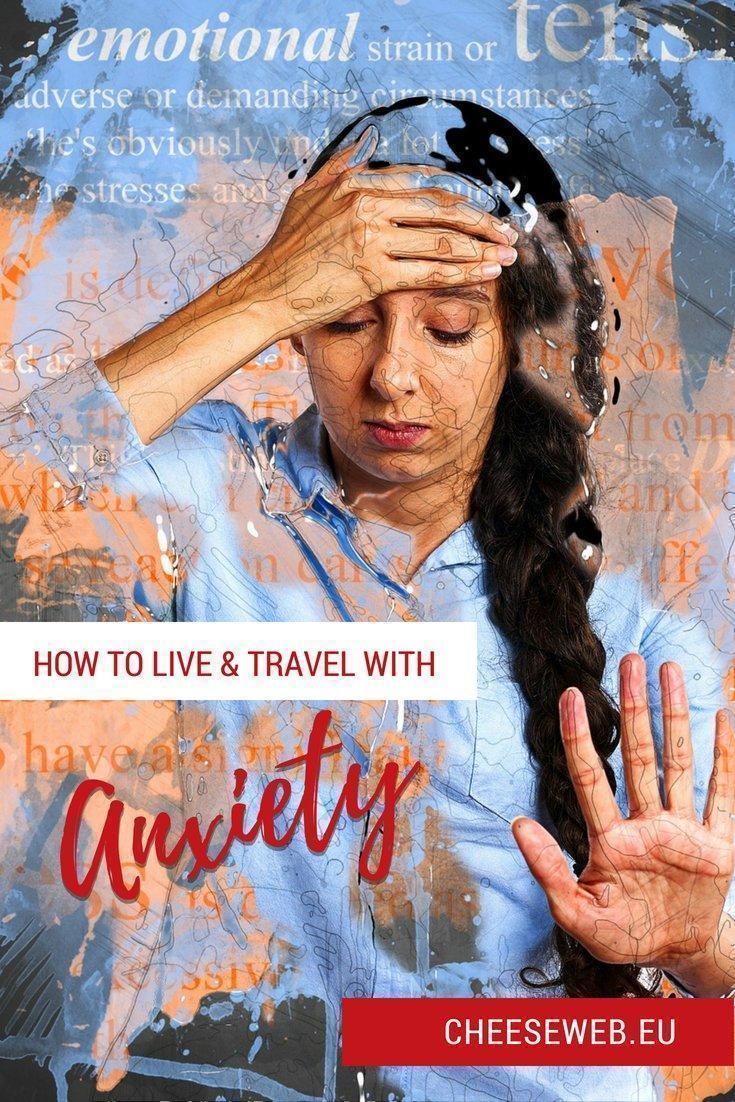
Save this article to Pinterest!
- The Ultimate List of Castle Hotels in Belgium - June 10, 2019
- The Ultimate Guide to the Best Things to Do in Normandy, France - February 5, 2019
- The Ultimate Guide to the Best Restaurants in Brussels, Belgium - January 11, 2019
